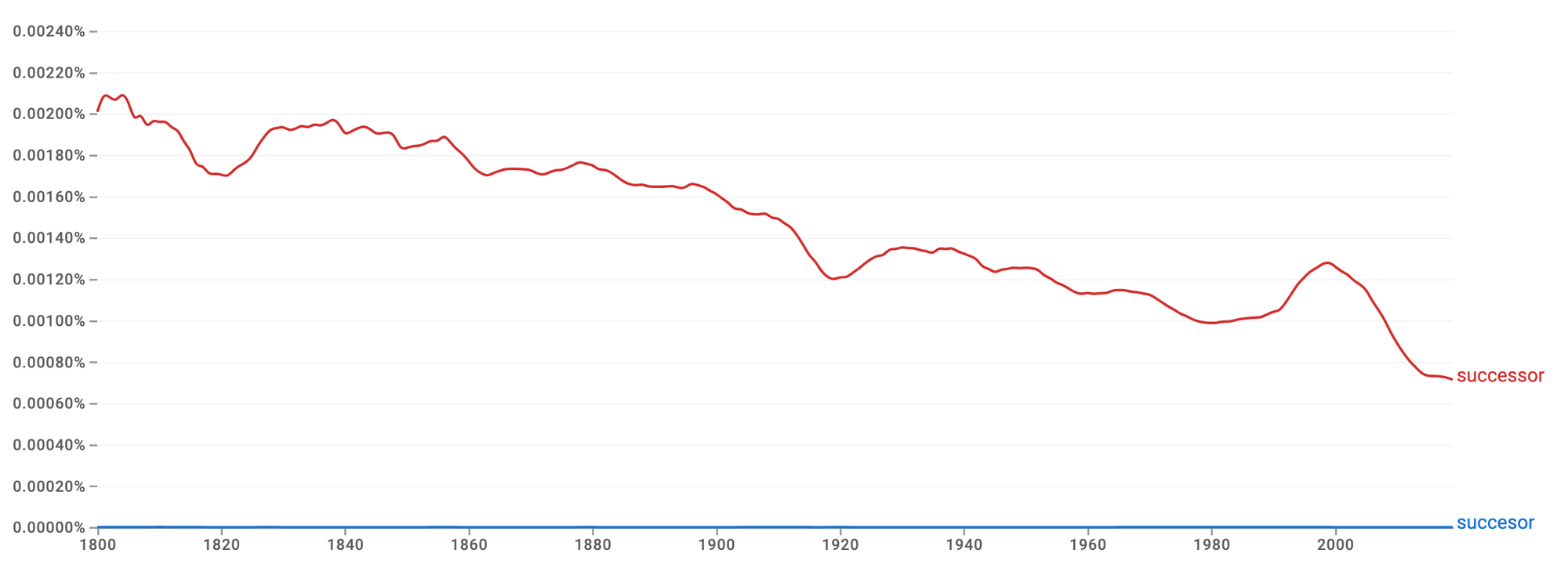- "Succesor" is an incorrect spelling of the word "successor."
- "Successor" refers to a person or thing that follows another in a position or sequence, especially someone who follows and takes over a job or position from someone else.
❌ The vice president is often considered the natural succesor to the president.
✅ The vice president is often considered the natural successor to the president.
In this sentence, "successor" indicates the person who follows and takes over the position of the president.
What does "successor" mean?
"Successor" is someone who comes after or follows someone else. Here are some ways to think about "successor":
1. The heir apparent: In its most classic sense, "successor" refers to the person or thing that follows another in office, position, or rank. Think of a crown prince destined to ascend the throne, or a newly elected mayor taking the reins from their predecessor.
2. The inheritor: Beyond titles and positions, "successor" can also denote the individual who inherits something of value, whether tangible or intangible. Imagine an artist's masterpiece finding its way to a worthy student, or a family recipe passed down through generations – both instances showcase the inheritance aspect of "successor."
3. The continuer: Sometimes, "successor" describes the one who carries on the work or legacy of another. Picture a scientist building upon the groundbreaking research of their mentor, or a band keeping the musical spirit of their forebears alive. Here, "successor" signifies the continuation of a path or tradition.
4. The replacement: In a more neutral sense, "successor" can simply be the person or thing that takes the place of another. Imagine a new model of smartphone replacing its outdated predecessor, or a fresh batch of cookies taking their place on the baking sheet. This usage highlights the substitution aspect of "successor."

The use of "succesor" and "successor" over time
The Ngram graph below shows how often "ment" and "meant" have been used from the 1800s to the 2000s. "Successor" has declined steadily since the 1800s, while its misspelling "succesor" has seen nearly zero use throughout.

How to pronounce "successor"
In British English, "successor" is pronounced like "suhk·seh·suh".
In American English, "successor" is pronounced like "suhk·seh·sr".
This is just the standard pronunciation, and there may be slight variations depending on regional accents and individual speech patterns.
Why would we misspell "successor" as "succesor"?
- Phonetic Similarity: The pronunciation of "successor" might lead someone to overlook the double "s" and mistakenly spell it as "succesor."
- Simplification of Spelling: Some individuals might simplify the spelling by dropping one of the "s"s, assuming it is redundant, leading to the misspelling as "succesor."
Other common misspellings of "successor"
- Sucessor
- Successer
- Succesor
- Succeser
- Sucesser
Example sentences of the misspelling of "successor" as "succesor"
- "Succesor" is not the proper spelling; the correct term is "successor."
- A common mistake in writing is the misspelling "succesor" when referring to someone following in a position.
- It's crucial to avoid the misspelling "succesor" in formal documents to maintain accuracy.
- In the corporate world, identifying the correct successor is essential for a smooth transition, but beware of the misspelling "succesor."
- The job posting clearly stated the qualifications for the successor role, and applicants should take note of the correct spelling.
Example sentences of "successor"
- The board unanimously approved the appointment of a new successor to the retiring CEO.
- Each monarch carefully considers and prepares their chosen successor to ensure a stable transition.
- The veteran actor mentored the young actress, grooming her to be his eventual successor.
- Identifying a capable and qualified successor is crucial for the long-term success of any organization.
- The chairman announced his official successor during the annual shareholders' meeting.
- The emperor's eldest son was the designated successor to the imperial throne.
- The political party held a convention to select its next successor for the upcoming election.
- The retiring professor spent years mentoring his brightest students, hoping one would become his academic successor.
- The founder of the company took pride in training his son as the designated successor to lead the business.
- In the medieval kingdom, the knights trained their young squires to be skilled warriors and potential successors on the battlefield.
🖊️ Excist vs. Exist: Which is the Correct Spelling?
🖊️ Imediate vs. Immediate: Which is the Correct Spelling?
Synonyms for "meant"
- Heir
- Follower
- Replacement
- Descendant
- Next in Line

Want to sound like a native speaker?
Engram’s AI-powered grammar checker makes your English sound like a native speaker’s, suggesting natural English expressions on top of fixing grammar, spelling, punctuation, word order, and vocabulary.

References:














